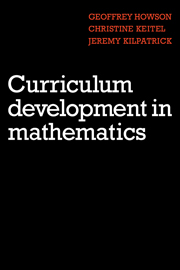Book contents
- Frontmatter
- Contents
- Preface
- 1 Curriculum development: an introduction
- 2 The historical background
- 3 Case studies of curriculum development
- 4 The practice and management of curriculum development
- 5 Curriculum theory and curriculum research
- 6 A retrospective look at curriculum projects
- 7 Evaluation within curriculum development
- 8 Lessons for today and tomorrow
- Appendix 1
- Appendix 2
- Bibliography
- Index
3 - Case studies of curriculum development
Published online by Cambridge University Press: 05 October 2010
- Frontmatter
- Contents
- Preface
- 1 Curriculum development: an introduction
- 2 The historical background
- 3 Case studies of curriculum development
- 4 The practice and management of curriculum development
- 5 Curriculum theory and curriculum research
- 6 A retrospective look at curriculum projects
- 7 Evaluation within curriculum development
- 8 Lessons for today and tomorrow
- Appendix 1
- Appendix 2
- Bibliography
- Index
Summary
Three projects
Before embarking on an analysis of how curriculum development in school mathematics has been managed, and how this management reflects various theories of curriculum change, the reader should be aware of the variety of forms that curriculum development can take. In this chapter we present case studies of three curriculum development projects in mathematics: The Fife Mathematics Project of Scotland, the Secondary School Mathematics Curriculum Improvement Study of the USA, and the Individualised Mathematics Instruction Project of Sweden. These three projects were chosen not because they are either typical or exemplary, but because together they serve to illustrate, about as well as three projects can, the variety of approaches that have been taken to the problem of managing mathematics curriculum development.
Each project is sketched in turn, and then together they are discussed as they relate to certain issues of management. Reporting on the Allerton Park conference (see p. 88) on styles of curriculum development, Stuart Maclure (1972) noted that to see contrasts in ‘style’ and in underlying values, one should look at issues that divide opinion rather than issues on which there is consensus. Maclure identified three key issues that divided opinion at the conference: (1) the contrast between centralised and decentralised systems, (2) the impact of curriculum development on the role of the teacher, and (3) the relation between the centre and the periphery. We have used these same three issues to illustrate some of the ways curriculum development projects can differ.
- Type
- Chapter
- Information
- Curriculum Development in Mathematics , pp. 35 - 48Publisher: Cambridge University PressPrint publication year: 1981

